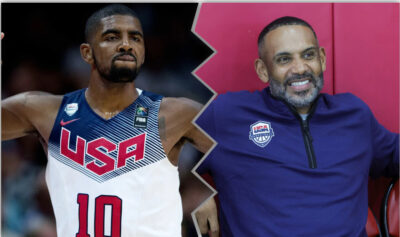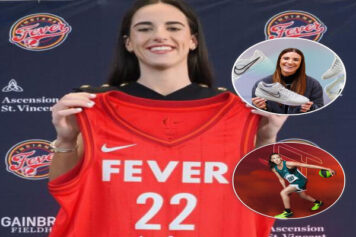North Carolina‘s athletics department is the Houdini of navigating serious infractions and PR nightmares in the face of seemingly irreparable and insurmountable allegations. For some reason, this lauded university continues to stay a step ahead of the NCAA and remain unblemished despite admitting to infractions and a colossal cheating scandal.
The university has gotten ahead of another potential disaster after self-reporting an NCAA violation due to the sale of team-issued shoes. The University of North Carolina announced that the school will suspend 13 football players, including potential starting QB Chazz Surratt, for at least one game this season for selling Jordan brand shoes theyd been given by the team in January. It’s considered a secondary violation by NCAA rules.
Nine players will miss four games each, and four other players will miss a combined three games. The Heels opener at Cal is on Sept. 1, followed by East Carolina, UCF, and Pitt.
The All-American on Twitter
North Carolina announces 13 players will miss games in 2018 due to NCAA violations.
The fact that these players are getting suspended is the deeper issue. It speaks to the slave-like control that major universities hold over their student-athletes and the way the NCAA supports and influences this “predatorial culture” as Turner Sports analyst Kenny Smith told me in March, by instituting rigid and harsh penalties that limit the student athlete’s ability to fully partake in capitalism and the American Dream.
In this case, the school gave the players footwear that the players sold for personal profit. God forbid. You would think these guys cheated on final exams or something. It’s hard to attack their moral fiber or their reasoning. They weren’t selling crack. Unfortunately, the NCAA and the heightened awareness concerning university corruption, stemming from the recent NCAA hoops scandal, breeds this kind of reaction.
AP Top 25 on Twitter
North Carolina coach Larry Fedora says players who sold team-issued shoes should have known better and are facing the consequences of their actions. More from @aaronbeardap: https://t.co/eBdLlBz2Lw https://t.co/z0oBttsBbG
To paraphrase ESPNs LZ Granderson, once the players were given these shoes it was theirs to do what they wanted with it. Thats how capitalism in America works. Why do the NCAA and universities have the right to give a kid a pair of sneakers as part of a scholarship that hes earned and then decide what he does with them?
Some of these kicks flip for up to $10K. Who wouldn’t sell them?
Mayor Of Leimert on Twitter
Me when they suspend me for one game after selling my UNC Jordan’s for 10k https://t.co/8pnUcFop0g
Carolina’s athletic department has been treading in some dangerous waters over the past decade and naturally, the school felt that it had to act immediately on these potential violations to avoid NCAA sanctions or scholarship penalties.
But this is another case of the student-athlete getting screwed and their capacity to create money being restricted by the NCAA. These are the issues that lead to more widespread corruption with boosters and agents and coaches and impermissible benefits that result in major scandals for prestigious universities.
ESPN’s Jalen Rose says that when he walked on Michigan’s campus as a freshman he realized that he also signed a sneaker contract when he committed to the school. The only difference was, the players were walking billboards who weren’t getting paid. He’s even suggested in the past that players boycott the NCAA Tournament.
Jalen Rose reacts to UNC suspending 13 players for selling team-issued shoes | Get Up! | ESPN
Jalen Rose shares his honest experience as a student-athlete who profited off of his school-issued gear after hearing about the 13 players suspended by North Carolina for selling their team-issued Nike Jordans.
The Tar Heel football players will be punished, but the NCAA and its ridiculous unwillingness to advance with the times are really at fault here.



